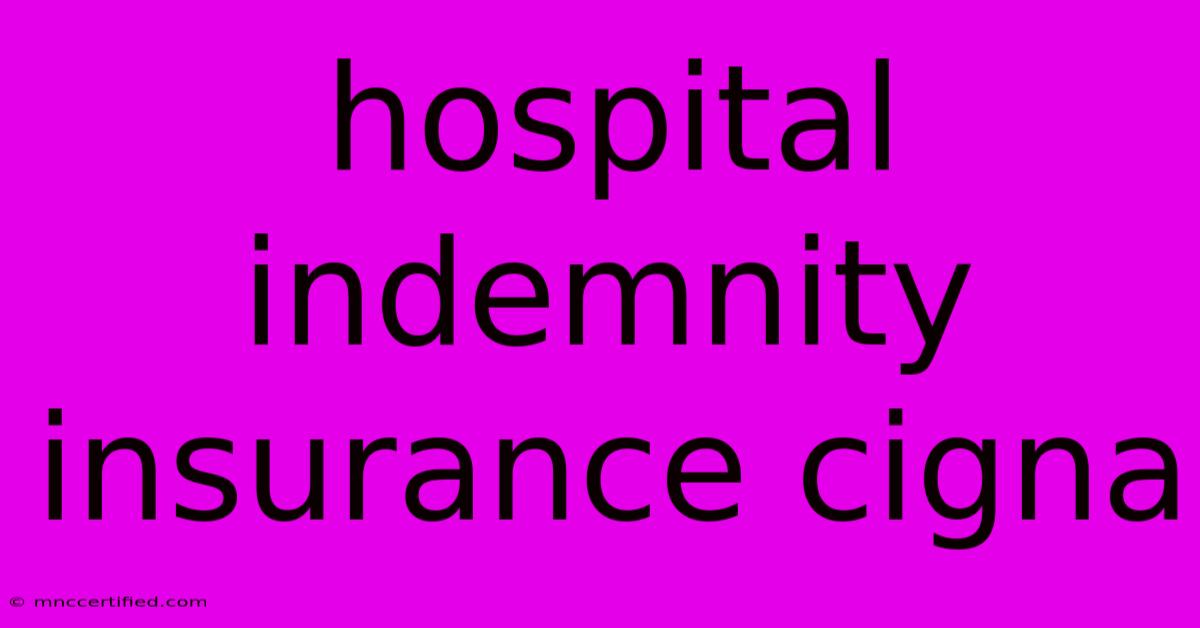Hospital Indemnity Insurance Cigna

Table of Contents
Hospital Indemnity Insurance with Cigna: A Comprehensive Guide
Are you looking for supplemental health insurance to help cover unexpected hospital expenses? Cigna offers Hospital Indemnity Insurance, a valuable tool that can significantly ease the financial burden associated with hospitalization. This comprehensive guide will delve into the specifics of Cigna's Hospital Indemnity Insurance, helping you understand its benefits, limitations, and how it can fit into your overall healthcare strategy.
What is Cigna Hospital Indemnity Insurance?
Cigna Hospital Indemnity Insurance is a supplemental health insurance plan designed to provide a cash benefit directly to you for each day you're hospitalized. Unlike your primary health insurance, which covers medical bills, this plan pays a fixed daily amount regardless of the actual cost of your care. This cash payment can be used to cover a wide range of expenses, including:
- Hospital bills: Help offset deductibles, copayments, and coinsurance.
- Prescription medications: Cover the cost of medications prescribed during your hospital stay.
- Lost wages: Compensate for income lost due to your inability to work.
- Travel expenses: Reimburse travel costs associated with seeking medical care.
Key Benefits of Cigna Hospital Indemnity Insurance
- Financial Protection: Provides a safety net against unexpected hospital bills, reducing the financial stress during a difficult time.
- Supplemental Coverage: Works alongside your primary health insurance plan to provide more comprehensive coverage.
- Flexibility: The cash benefit can be used for various expenses related to your hospitalization, giving you control over how the funds are spent.
- Simplicity: The plan is relatively easy to understand and administer, with straightforward payouts based on the number of days hospitalized.
How Does Cigna Hospital Indemnity Insurance Work?
Cigna's Hospital Indemnity Insurance typically operates as follows:
- Enrollment: You apply for and enroll in the plan, choosing a coverage level that suits your needs and budget.
- Hospitalization: When hospitalized, you meet the plan's eligibility criteria (e.g., minimum stay, specific conditions).
- Claim Submission: After discharge, you submit a claim to Cigna, providing necessary documentation.
- Benefit Payment: Once your claim is approved, Cigna pays the specified daily benefit directly to you.
Factors Affecting Coverage and Cost
Several factors influence the cost and coverage of Cigna's Hospital Indemnity Insurance:
- Plan Type: Different plans offer varying daily benefit amounts and coverage options.
- Age: Premiums generally increase with age.
- Health Status: Pre-existing conditions may affect eligibility or premium rates.
Comparing Cigna Hospital Indemnity Insurance to Other Options
Before choosing Cigna's Hospital Indemnity Insurance, consider comparing it to other supplemental health insurance options, such as:
- Critical Illness Insurance: Covers specific critical illnesses, offering a lump-sum payment.
- Accident Insurance: Provides benefits for accidents resulting in injury or hospitalization.
- Short-Term Disability Insurance: Replaces a portion of your income if you're unable to work due to illness or injury.
Finding the Right Cigna Hospital Indemnity Insurance Plan
Choosing the right plan depends on your individual needs and financial situation. Consider these factors:
- Your current health insurance coverage: Determine what gaps your existing plan leaves.
- Your budget: Compare premiums and benefits to find a plan that fits your finances.
- Your risk tolerance: Assess your willingness to pay premiums for supplemental coverage.
Contacting Cigna for More Information
To obtain detailed information about specific plans, premiums, and eligibility criteria, it's crucial to contact Cigna directly or visit their official website. A Cigna representative can answer your questions and help you choose the most suitable plan for your circumstances.
Conclusion: Is Cigna Hospital Indemnity Insurance Right for You?
Cigna Hospital Indemnity Insurance can be a valuable addition to your healthcare plan, providing financial protection during unexpected hospitalizations. However, it's essential to carefully consider your needs, budget, and existing coverage before enrolling. By understanding the benefits, limitations, and cost factors, you can make an informed decision about whether this supplemental insurance is the right choice for you. Remember to compare it with other options and contact Cigna for personalized advice. This will ensure you have the best possible protection against the financial burden of unforeseen hospital stays.

Thank you for visiting our website wich cover about Hospital Indemnity Insurance Cigna. We hope the information provided has been useful to you. Feel free to contact us if you have any questions or need further assistance. See you next time and dont miss to bookmark.
Featured Posts
-
Stallones Trump Comparison Second Washington
Nov 16, 2024
-
Tate Mc Rae Tour Tickets Prices And Presale Codes
Nov 16, 2024
-
Bloomington Indiana Auto Insurance
Nov 16, 2024
-
Children In Need 2024 Tv And I Player
Nov 16, 2024
-
Portugals Overdue Anti Bribery Measures
Nov 16, 2024